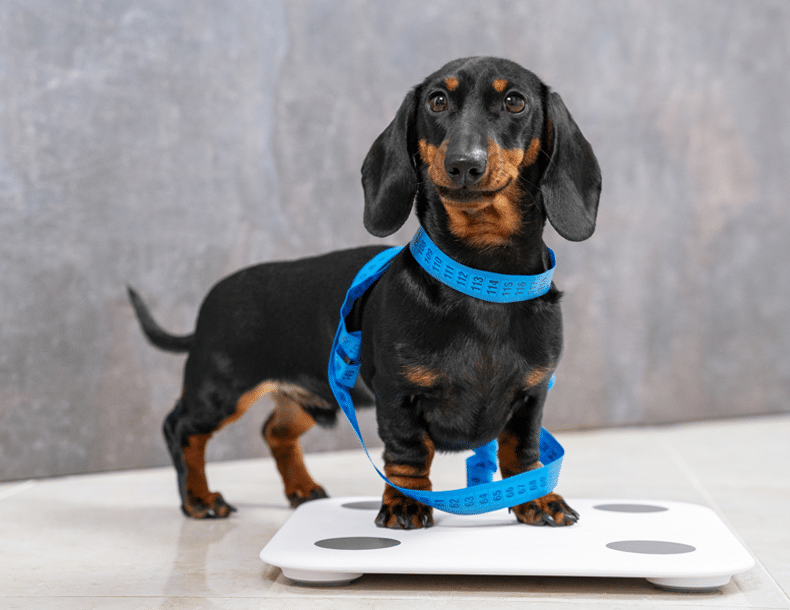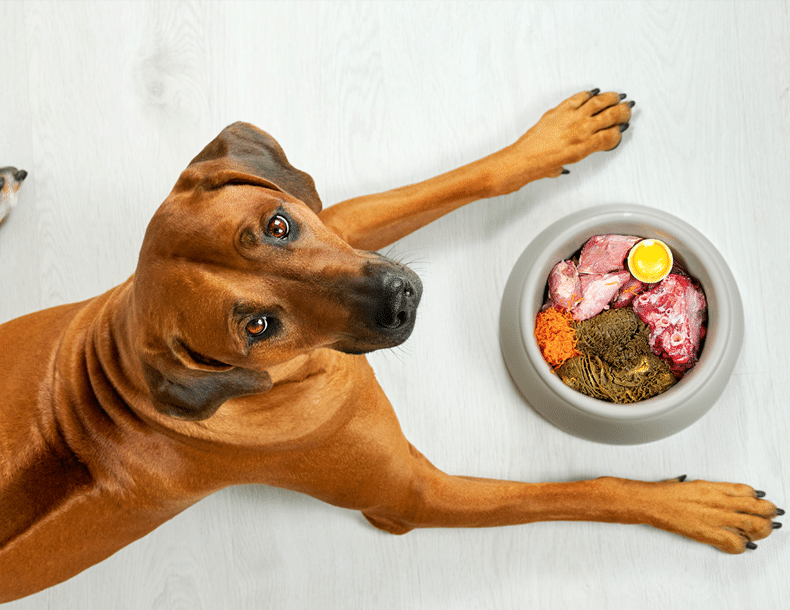Age-Appropriate Dog Weight and Nutrition: How to Feed Your Puppy, Adult or Senior Dog

It’s important to feed your dog a healthy diet considering their weight and age. Your dog must get the nutrients it needs to maintain and repair body tissue. The nutrition in your dog’s food will also support energy levels and mood. Nutritional needs vary depending on your dog’s size, and they will change as your dog ages. This article will review age-appropriate dog weight and nutrition to ensure your pup is getting the vitamins and minerals they need to maintain optimal health.
Proper Nutrition for Puppies: How to Ensure Proper Nutrition and Weight
Puppies need a diet that will help them reach their growth and development goals. Pet owners should focus on the following key nutrients when planning their puppy’s diet:
- Protein: Puppies require protein to support hair, skin, nails, tendons, ligaments, muscles, and cartilage. A puppy’s diet should consist of 22-23% protein. Protein should be sourced from food, not nutritional supplements.
- Calcium and Phosphorus: Calcium is necessary for puppy bone development. But puppies under 5 months may have difficulty adjusting calcium absorption which can increase the risk of bone fractures. Phosphorus aids with calcium absorption and should be consumed at a ratio of 3:1.
- Fats and Fatty Acids: Omega-3 fatty acids support the development of the brain, central nervous system, and vision.
- Vitamin E: Vitamin E supports eyesight development and increases immunity.
- Fiber: Fiber is beneficial to puppies’ digestion. It has prebiotic characteristics that support the growth of ‘good bacteria’ in the intestinal tract.
Calorie Intake: Up to 4 month old, puppies should consume 115 calories of food per day for every pound of body weight. Recommended consumption decreases to 77 calories per every pound of body weight for dogs over 4 months.
Proper Nutrition for Adult Dog: How to Maintain and Healthy Weight and Balanced Diet
As dogs get older, age-appropriate dog weight and nutrition should focus on healthy aging. The right diet will reduce your dog’s risk of developing disease as they get older. It’s also important for dogs to maintain a healthy weight as obesity can negatively affect health.
Here are some important components of an adult dog’s diet.
- Protein and Amino Acids: Protein is an essential part of every dog’s diet. It contains 10 amino acids that dogs can’t make on their own. It is needed to produce glucose for energy.
- Fats and Fatty Acids: Fatty acids play a key role in cell structure and function. Essential fatty acids keep a dog’s skin and coat healthy.
- Carbohydrates: Carbohydrates are vital to energy production.
- Vitamin B12: Vitamin B12 contributes to a healthy nervous system.
- Vitamin E: Vitamin E is an antioxidant that is vital in preventing disease and maintaining skin and fur health.
Calorie Intake: An adult dog should consume 63 calories per day for every pound of body weight.
Proper Nutrition for Senior Dog: How to Promote Wellness in Their Golden Years
Small dogs are considered seniors at the age of 11-12 while large dogs become seniors when they are 7-8. When dogs hit these milestones, age-appropriate dog weight and nutrition needs to change.
Owners must focus on a dog diet that controls calorie intake, prevents nutrient excesses, and ensures proper hydration. The diet should also include nutrients that support joint health as dogs become prone to arthritis when they get older. Key elements include:
- Protein: There is some debate concerning how much protein to give an older dog. However, most agree the diet should consist of 28%- 32%. The protein must be high quality. While protein is not known to cause kidney disease, it can increase the progression of kidney disease.
- Glucosamine and Chondroitin: Glucosamine is a building block for the synthesis of cartilage tissue. Chondroitin is a major cartilage component. The two are often taken together to support joint health and reduce the risk of arthritis and arthritis symptoms.
- Calcium and phosphorus: Dogs’ bones weaken as they age. Calcium and phosphorus are recommended for boosting bone health. Dogs may also benefit from vitamin D which aids with calcium absorption.
- Fiber: Fiber helps dogs maintain healthy digestion as they get older.
- Zinc: Zinc aids with the loss of skin elasticity and moisture dogs experience as they age.
- Calorie Intake: Senior dogs should be eating 25 to 30 calories per pound of dog weight each day.
How Much Should Your Dog Weigh: Tips for Maintaining a Healthy Weight
Dogs must maintain a healthy weight. Fit dogs are less likely to develop conditions like heart disease, diabetes, and arthritis. They also live about 1.8 years longer than their overweight peers.
The amount your dog should weigh will vary depending on their size, gender, and body composition. However, you can tell your dog is too thin if its ribs, lumbar, and vertebrae are highly visible.
If your dog is too heavy, you may not see their ribs at all. You may see fat deposits on various parts of the body.
A dog of normal weight will have palpable ribs, minimal fat, and definition in the waistline. The tummy will appear tucked from the side.
If your dog is too heavy, you can take him or her to exercise more often. But the most effective way for dogs to lose weight is to cut back on food consumption.
Try giving your dog smaller portions of his or her current food. Try wet food instead of dry as it’s lower in fat and calories. Talk to your vet about low-calorie alternatives.
Choosing the Right Food for Your Dog for a Balanced Diet
Age-appropriate dog weight and nutrition involves finding dog food that caters your pup’s health needs. Most dog foods are labeled for puppies, adult dogs, or seniors. Some are for all stages of life. Choose the food that best describes your dog.
You should also look at the ingredient list when picking out dog food. The food you choose should have recognizable ingredients that you can count on to be healthy. It should not contain a lot of unknown ingredients and preservatives.
Not every dog food brand will list the calorie count on the package. However, you may be able to glean this information by contacting the manufacturer directly.
Conclusion
A healthy diet is an essential part of dog health. K9U focuses on canine wellness by providing them with food made with the finest ingredients while they are in our care. We offer a variety of U.S.made premium dog food by brands like Fromm, Stella & Chewy’s, and Ziwi.
We also make a point of keeping dogs active. Our Dog Daycare offers 29,000 square feet of indoor and outdoor play areas. We provide Individual Activities for Dogs like playing fetch, treadmill exercise, and rope toy tugging. Our Dog Daycamp engages your dog in training activities that get them moving.
The right food will help your dog enjoy a longer, higher quality of life. What will you be including in your dog’s diet to help them reach their wellness and nutritional goals?




